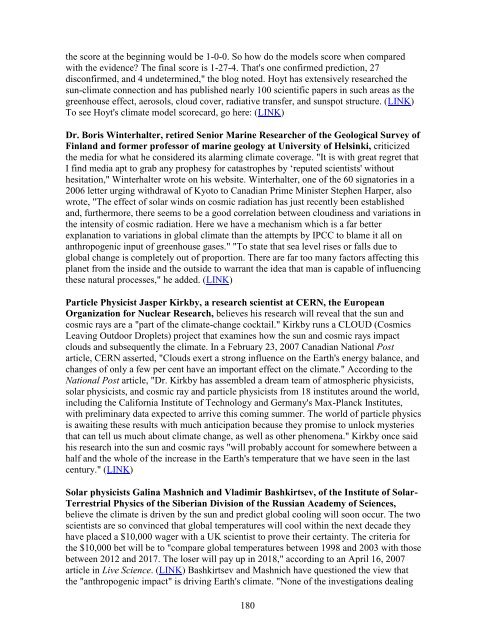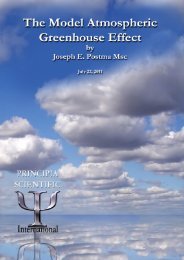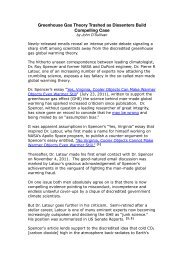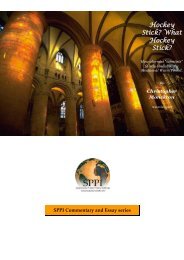Than 1000 International Scientists Dissent Over Man-Made Global ...
Than 1000 International Scientists Dissent Over Man-Made Global ...
Than 1000 International Scientists Dissent Over Man-Made Global ...
You also want an ePaper? Increase the reach of your titles
YUMPU automatically turns print PDFs into web optimized ePapers that Google loves.
the score at the beginning would be 1-0-0. So how do the models score when compared<br />
with the evidence? The final score is 1-27-4. That's one confirmed prediction, 27<br />
disconfirmed, and 4 undetermined," the blog noted. Hoyt has extensively researched the<br />
sun-climate connection and has published nearly 100 scientific papers in such areas as the<br />
greenhouse effect, aerosols, cloud cover, radiative transfer, and sunspot structure. (LINK)<br />
To see Hoyt's climate model scorecard, go here: (LINK)<br />
Dr. Boris Winterhalter, retired Senior Marine Researcher of the Geological Survey of<br />
Finland and former professor of marine geology at University of Helsinki, criticized<br />
the media for what he considered its alarming climate coverage. "It is with great regret that<br />
I find media apt to grab any prophesy for catastrophes by ‗reputed scientists' without<br />
hesitation," Winterhalter wrote on his website. Winterhalter, one of the 60 signatories in a<br />
2006 letter urging withdrawal of Kyoto to Canadian Prime Minister Stephen Harper, also<br />
wrote, "The effect of solar winds on cosmic radiation has just recently been established<br />
and, furthermore, there seems to be a good correlation between cloudiness and variations in<br />
the intensity of cosmic radiation. Here we have a mechanism which is a far better<br />
explanation to variations in global climate than the attempts by IPCC to blame it all on<br />
anthropogenic input of greenhouse gases." "To state that sea level rises or falls due to<br />
global change is completely out of proportion. There are far too many factors affecting this<br />
planet from the inside and the outside to warrant the idea that man is capable of influencing<br />
these natural processes," he added. (LINK)<br />
Particle Physicist Jasper Kirkby, a research scientist at CERN, the European<br />
Organization for Nuclear Research, believes his research will reveal that the sun and<br />
cosmic rays are a "part of the climate-change cocktail." Kirkby runs a CLOUD (Cosmics<br />
Leaving Outdoor Droplets) project that examines how the sun and cosmic rays impact<br />
clouds and subsequently the climate. In a February 23, 2007 Canadian National Post<br />
article, CERN asserted, "Clouds exert a strong influence on the Earth's energy balance, and<br />
changes of only a few per cent have an important effect on the climate." According to the<br />
National Post article, "Dr. Kirkby has assembled a dream team of atmospheric physicists,<br />
solar physicists, and cosmic ray and particle physicists from 18 institutes around the world,<br />
including the California Institute of Technology and Germany's Max-Planck Institutes,<br />
with preliminary data expected to arrive this coming summer. The world of particle physics<br />
is awaiting these results with much anticipation because they promise to unlock mysteries<br />
that can tell us much about climate change, as well as other phenomena." Kirkby once said<br />
his research into the sun and cosmic rays "will probably account for somewhere between a<br />
half and the whole of the increase in the Earth's temperature that we have seen in the last<br />
century." (LINK)<br />
Solar physicists Galina Mashnich and Vladimir Bashkirtsev, of the Institute of Solar-<br />
Terrestrial Physics of the Siberian Division of the Russian Academy of Sciences,<br />
believe the climate is driven by the sun and predict global cooling will soon occur. The two<br />
scientists are so convinced that global temperatures will cool within the next decade they<br />
have placed a $10,000 wager with a UK scientist to prove their certainty. The criteria for<br />
the $10,000 bet will be to "compare global temperatures between 1998 and 2003 with those<br />
between 2012 and 2017. The loser will pay up in 2018," according to an April 16, 2007<br />
article in Live Science. (LINK) Bashkirtsev and Mashnich have questioned the view that<br />
the "anthropogenic impact" is driving Earth's climate. "None of the investigations dealing<br />
180





